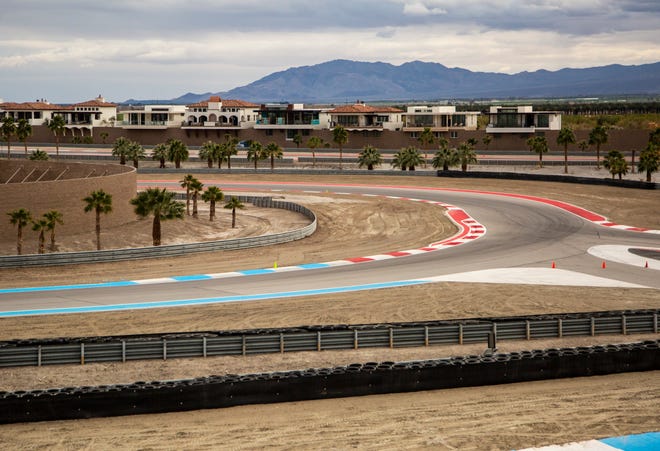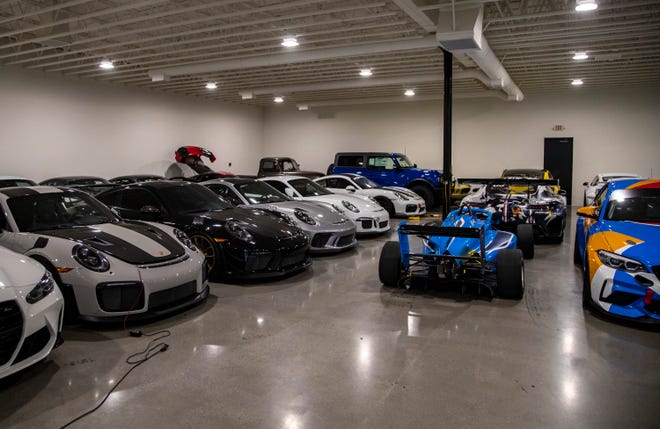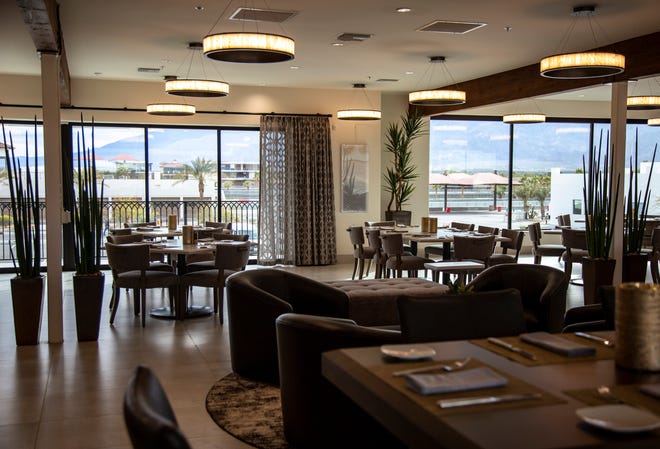Courtesy of Nathan Brown Indianapolis Star – Photos: Andy Abeyta/The Desert Sun

The start/finish line of the main race course is seen at The Thermal Club in Thermal, Calif., Monday, Jan. 30, 2023.
THERMAL, Calif. — Tim Rogers heard the figure and scoffed.
More than a decade ago, an acquaintance was talking about the prospect of opening a lavish “country-club-meets-car-meet-up,” a one-of-a-kind, exclusive club for gearheads and racing enthusiasts alike. Rogers had spent the last 20 years striking it rich, selling gas to 7/11 across 36 states for $7.5 billion then owning a string of local grocery stores that, he boasts, each sell $2,000 in fried chicken everyday.
“And I told him, ‘You’re wrong, you need $30 million,’” Rogers remembers.
“And I was still wrong.”
Around the time The Thermal Club opened in 2012, Rogers and his wife, Twanna, had spent close to $90 million. By 2018, that had grown to $150 million. And Monday afternoon, as he sipped on his club’s own version of the Coachella Valley’s famous date shake, Rogers wore like a badge of honor the fact they had now poured $275 million into a club that’s grown to 210 members, 75 properties and 135 lots sold.
What was once a $1,200 per month membership fee has doubled over the last five years, on top of a $175,000 initiation fee and the cost of purchasing a lot and building a 30,000 square-foot home within five years of joining, which is now roughly $5 million.
A three-person design review committee that includes Rogers, his construction manager and main architect, hold an unyielding veto over the exterior design of any home on the property. And if, after passing a rigorous, though informal, interview process to gain membership, someone were to run afoul of the Club’s tight-knit, jovial group, Rogers boasts the right to kick a member out, no questions asked.

“I want to make sure we have all the amenities I would expect for a high-end club, because if someone’s going to spend $5 million, they’re going to want to have a nice restaurant, a spa, a hotel for their guests, fitness center, tennis courts, a pool,” Rogers detailed. The grounds of his oasis include 48 guest casitas, three restaurants, a new 1.1-mile go-kart track and a 70-car storage facility for members’ race cars with untold millions worth of Lamborghinis, Ferraris, Porsches, Mercedes and LMP2 race cars inside. Next to it, the heir to the Clorox brand houses his own 40-car Ferrari collection in a vault that would make Batman grin.
To top it all off, the grounds feature all the gas pumps, car washes, detailing equipment and full-time mechanics and driving instructors. And when members wish to sell that classic Ferrari for the newest Porsche, Rogers has trusted car salesmen onsite who serve as the middleman to ensure Club members get a fair price.
“I’ve spent over $275 million developing this so far, and we’ve got $500 million in property we’re trying to sell,” Rogers continued. “We don’t advertise. We use word-of-mouth.”

And IndyCar, he hopes, will help continue to build his 300-plus acre empire inside the 18-foot brick walls. “I always wanted to have a race here, but we didn’t want to until we built things up,” he said. “’Cause you only have one shot at a first impression.”
A pairing 10 years in the making
Rogers is nothing if not welcoming and inviting, but, as he jokes, publicity isn’t often the goal. He occasionally gives media members a hard time, in between grins, before revealing he expects to host more than 70 on Thursday and Friday as he throws his doors open for a never-been-done-before test of his club’s mettle.
Since Rogers hosted then-IndyCar CEO Randy Bernard at his ribbon-cutting ceremony more than a decade ago, and after his numerous phone calls with current series owner Roger Penske to help find the right asphalt consultant, The Thermal Club’s owner has held a distant connection to the premier American open-wheel series. Among its owners include Mike Long, who recently stepped down after more than a decade as CEO of Arrow Electronics – the title partner of McLaren’s IndyCar arm – and Don Cusick, who for the last three years has backed Stefan Wilson’s Indianapolis 500 entries.

That pair helped push for a formal sit-down between the two sides last spring, as IndyCar made its annual run around the streets of Long Beach, just a few hours down the freeway from Rogers’ racing hideaway. Talks ramped up later that summer about the Club hosting IndyCar’s preseason open test, and by the fall, the makings of a deal were in place. For the series, in need of a consistent, reliable – and most importantly, warm – preseason testing spot for its entire paddock, the deal makes clear sense.
Three years removed from a disaster of a full-field test at Circuit of the Americas in Austin with temperatures rarely above 50 degrees as biting rain fell almost constantly, and without any other permanent tracks on the calendar housed in a moderate winter climate (save for finale track Laguna Seca, where IndyCar will test in September), the marriage was perfect, if not curiously out-of-the-box and slightly inconvenient.
Coming on the heels of IMSA’s Rolex 24 season kickoff last weekend on the other side of the country, nearly half the IndyCar paddock had to juggle flying from Daytona to the west coast Sunday night. Before testing Thursday and Friday, nearly 30 drivers will weather their preseason media responsibilities Tuesday and Wednesday.
IndyCar president Jay Frye told IndyStar he’d heard nothing but excitement from his paddock members about the exotic trip. Privately, however, some of the series’ veteran drivers and successful team owners, who must foot what is said to be a roughly $1 million bill for a three-car team to travel across the country, the mood has been, at times, different.
“We think this is going to be great for the teams,” Frye told IndyStar on Monday. “We see the members here, influential people in the world, and they’re car nuts, and we’re bringing our cars to them. Hopefully, we entertain them for a few days, and maybe our drivers and teams can leave with some new friends. I never got any pushback in any way. It was really the opposite. There’s been enthusiasm because people understand the end game.”
IndyCar’s potential high-rolling, made-for-TV future at Thermal
As Frye roamed the grounds Monday afternoon, helping his team connect cables, inspect the track and set up marshalling and timing equipment, he couldn’t help but notice the early makings of a lavish high-rolling party around him. Outside homes across the property, he spotted vans bussing in speaker systems and caterers getting the lay of the land.

Though IndyCar’s two-day open test is famously closed to the general public, Rogers is expecting dozens of members’ guests to take in the action. The track owner has permitted each member to invite up to 20 guests onto the grounds Thursday and Friday, from which each member can then rotate through six paddock passes for up-close-and-personal access to the IndyCar world.
“One guy said he’s going to have a head chef, two sous chefs, two bartenders, cleaning people and servers, and I told him, ‘You can only have 20 people!” Rogers said. “And he quickly replied, ‘Oh, I’m inviting other members!”
Picture a bustling college town on a Friday night, with slightly inebriated revelers roaming the streets, and swap the dingy, sometimes rundown rental homes for $5 million desert villas.
Though IndyCar’s two-day open test is famously closed to the general public, Rogers is expecting dozens of members’ guests to take in the action. The track owner has permitted each member to invite up to 20 guests onto the grounds Thursday and Friday, from which each member can then rotate through six paddock passes for up-close-and-personal access to the IndyCar world.
“One guy said he’s going to have a head chef, two sous chefs, two bartenders, cleaning people and servers, and I told him, ‘You can only have 20 people!” Rogers said. “And he quickly replied, ‘Oh, I’m inviting other members!”
Picture a bustling college town on a Friday night, with slightly inebriated revelers roaming the streets, and swap the dingy, sometimes rundown rental homes for $5 million desert villas.
On Rogers’ potential wish list is a made-for-TV preseason showcase that would be part PGA Tour pro-am, part NASCAR Clash, part MLB home run derby, perhaps with a little SRX flair sprinkled in. Initial talks have been held between the two sides to host a type of pro-am series of races featuring IndyCar drivers, some of the club’s best member racers and a high-stakes pot. In Rogers’ vision, for a $250,000 buy-in, the clubs’ drivers would be randomly paired with an IndyCar driver.
An opening members’ race that might last 40 minutes, typical of the Club’s monthly race series events, would then set IndyCar’s starting grid based on their partner’s finish. The IndyCar drivers would then try and beat out the field for their duo’s shot at a multi-million-dollar payday in a preseason non-points-paying event akin to NASCAR’s kickoff just down the road at the LA Coliseum later this week.
It all sounds good on paper, but Rogers is clearly still not nearly convinced.

“That’s a lot of pressure on our members to ask them to write a $250,000 check to do each time,” he said. “So we’ll have to see how this goes.”
Though he dances around the topic, it seems clear he was expecting a bit higher level of promotion and publicity for his track’s help in lending a testing home for the all-important start to IndyCar’s season. In the initial plans was a full-test stream of all the on-track action, either to be aired on NBC’s Peacock platform or IndyCar’s YouTube channel.
Rogers’ staff even went through the process of ordering all the cabling that would’ve been necessary to line The Thermal Club with the cameras and equipment. Then somewhat last-minute, a call came in.
“All a sudden, they contacted us and said they’d decided not to,” Rogers said. Though Frye wouldn’t say so directly, the couple-hundred-thousand-dollar cost of a outfitting a robust camera setup with towers, miles of fiber and cords and the use of NBC’s full TV compound and broadcast team – for a series trying to build a deeper marketing budget – is said to have been the downfall. Still, IndyCar has said it will provide wall-to-wall social media coverage of the event, including in-car camera footage, live timing and scoring and post-session video breakdowns on the IndyCar app.
For IndyCar, the execution of a clean, productive couple days of testing would make for a somewhat subjective tell on whether this pairing was a success. For Rogers, things are a bit more cut-and-dry. Within another 10 years, he hopes, The Thermal Club will be full, with all the nearly million-dollar lots and $500-a-month race car storage spots filled or spoken for as he fulfills his initial $30 million dream.

